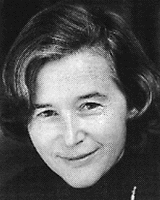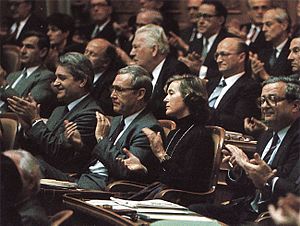Elisabeth Kopp facts for kids
Quick facts for kids
Elisabeth Kopp
|
|
|---|---|
 |
|
| Vice President of Switzerland | |
| In office 1 January 1989 – 12 January 1989 |
|
| President | Jean-Pascal Delamuraz |
| Preceded by | Jean-Pascal Delamuraz |
| Succeeded by | Arnold Koller |
| Minister of Justice and Police | |
| In office 2 October 1984 – 12 January 1989 |
|
| Preceded by | Rudolf Friedrich |
| Succeeded by | Arnold Koller |
| Member of the Swiss Federal Council | |
| In office 2 October 1984 – 12 January 1989 |
|
| Preceded by | Rudolf Friedrich |
| Succeeded by | Kaspar Villiger |
| Personal details | |
| Born |
Anna Elisabeth Iklé
16 December 1936 Zürich, Switzerland |
| Died | 7 April 2023 (aged 86) Zumikon, Zurich, Switzerland |
| Political party | FDP |
| Spouse |
Hans W. Kopp
(m. 1960; died 2009) |
| Children | 1 |
| Alma mater |
|
Anna Elisabeth Kopp (born Iklé; December 16, 1936 – April 7, 2023) was an important Swiss politician. She was a member of the Free Democratic Party (FDP). Elisabeth Kopp made history as the first woman to be part of the Federal Council. This is like the government's cabinet in Switzerland. She served in this high office from October 2, 1984, until January 12, 1989, when she resigned. Before that, she was a member of the National Council from 1979 to 1984.
Contents
Early Life and Education
Elisabeth Kopp was born in Zürich, Switzerland, on December 16, 1936. Her parents were Max and Beatrix Iklé. Her father worked for the government's finance department and was on the board of the Swiss National Bank. Her family had a history in textile manufacturing.
She grew up in Bern with her two sisters, Marianne and Beatrix. After high school, Elisabeth started studying law at the University of Zurich in 1956. She earned her law degree in 1960. While studying, she joined a group called the Swiss-Hungarian Student Relief Organisation. This group helped Hungarian refugees in Switzerland after the Hungarian Revolution of 1956.
In 1960, she married Hans W. Kopp and moved to Zumikon. In 1963, she had a daughter. For a few years, she focused on being a housewife.
Political Career
Elisabeth Kopp started her political journey in 1970. She became a municipal councilor in Zumikon. In 1974, she became the first female president of a town in the canton of Zurich. From 1972 to 1979, she was part of the executive council for the canton of Zürich.
In 1979, she was elected to the National Council of Switzerland. This is one of the two parts of the Swiss parliament. She served there from 1979 to 1984.
Focus on Environmental Issues
Elisabeth Kopp became known for her work on environmental issues. In 1981, she pushed for stricter rules on car engines to reduce pollution. This was a big step, and she gained recognition as an environmental politician. She worked with groups like the World Wide Fund (WWF). Her efforts helped lead to cars needing catalytic converters to clean up exhaust. She also joined the Swiss League for the Protection of Nature, which is now called Pro Natura.
Other Political Views
Besides the environment, she supported nuclear energy as a clean power source. She also supported expanding the airport in Zurich.
Becoming a Federal Councillor
In 1984, a member of the Federal Council, Rudolf Friedrich, resigned. The Free Democratic Party nominated Elisabeth Kopp to take his place.
On October 2, 1984, Elisabeth Kopp was elected to the Federal Council. This was a historic moment because she was the first woman ever to hold this position. She received many votes, showing strong support.
During her time in the Federal Council, she led the Federal Department of Justice and Police. She also briefly served as the vice president of the Confederation in 1989. One of her main goals was to update the laws for people seeking asylum (refugees). She created a special role to help refugees. Her reforms were approved by the public in a referendum in 1987.
Personal Life
In 1960, Elisabeth Iklé married Hans W. Kopp. He was a lawyer. They had one daughter named Brigitte, born in 1963. The Kopp family lived in Zumikon on an estate called Three Oaks. Elisabeth Kopp loved nature and surrounded her home with special plants and even a waterfall powered by solar energy. Elisabeth Kopp passed away on April 7, 2023, at the age of 86.
Film
- Andres Brütsch: Elisabeth Kopp – Eine Winterreise (A Winter's Journey: Switzerland's First Female Minister), documentary, 85 min., Topic Film, January 2007
See also
 In Spanish: Elisabeth Kopp para niños
In Spanish: Elisabeth Kopp para niños
 | John T. Biggers |
 | Thomas Blackshear |
 | Mark Bradford |
 | Beverly Buchanan |


